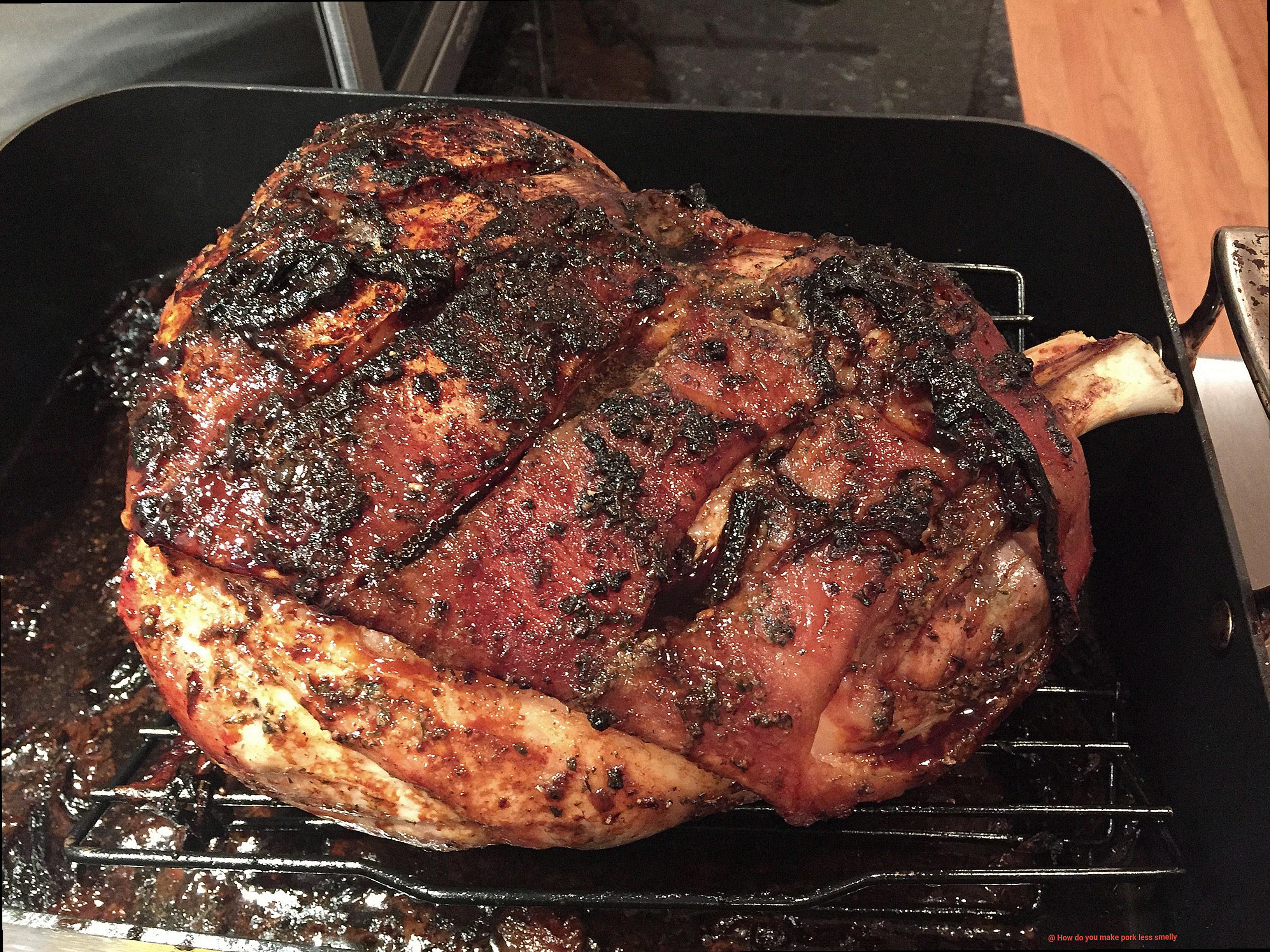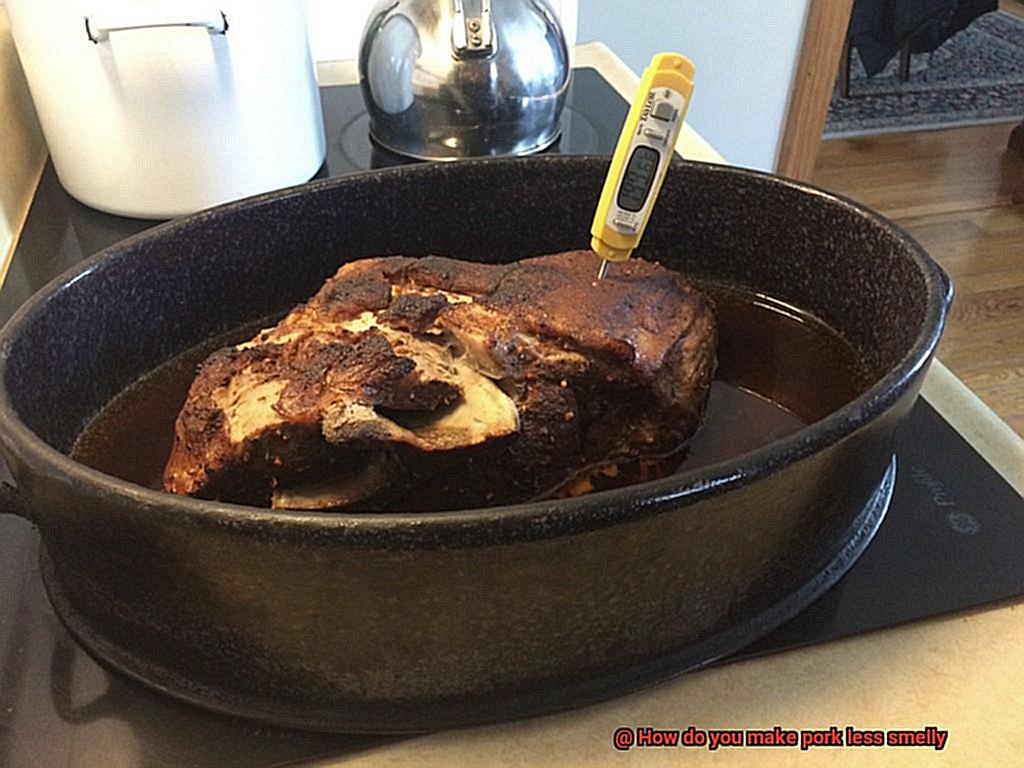Imagine this: you’re all excited to cook up a savory pork dish, but as soon as you open the package, an overpowering stench hits your nose. Don’t panic. There are simple ways to reduce the smell and make your pork more appetizing. In this blog post, we’ll tackle the question on everyone’s mind: how do you make pork less smelly?
Pork can emit a strong odor for several reasons. It could be due to improper storage or exposure to bacteria. Even high-quality, fresh pork can sometimes have an unpleasant smell. But fret not, because there are tried-and-tested methods that can help.
We’ll explore techniques such as marinating your pork in acidic ingredients like vinegar or citrus juice, using aromatic herbs and spices to mask the smell, and even soaking it in milk. Plus, we’ll dive into the importance of properly cleaning and storing your pork to prevent any unsavory odors from developing.
Whether you’re a seasoned chef or just starting out in the kitchen, knowing how to make pork less smelly is crucial for creating delicious dishes that don’t leave behind a funky aroma. So let’s dive into the world of pork and discover ways to enhance its flavor while minimizing any unwanted smells.
Contents
Marinating the Meat Before Cooking

Marinating the Meat Before Cooking: The Secret to Mouthwatering and Odorless Pork
Are you tired of the strong smell of pork that permeates your kitchen every time you cook it? Fear not, for marinating the meat before cooking is the solution that you need. Marinating pork not only masks its natural odor but also enhances its flavor. In this article, we’ll delve into why marinating is essential and explore the best practices for doing so.
Why Marinate Pork?
Marinating pork is a popular technique used to reduce its natural smell and infuse it with delectable flavors. The acidic marinade breaks down the proteins in the meat and allows the flavors to penetrate deeply. There’s an array of marinades that you can use for pork, such as soy sauce, vinegar, citrus juice, and wine. You can also add herbs and spices to create a unique flavor profile.

Best Practices for Marinating Pork

Use a Non-Reactive Container – When marinating pork, it’s crucial to use a non-reactive container like glass, plastic, or stainless steel. Avoid using reactive containers such as aluminum or copper since they can react with the acid in the marinade and cause off-flavors.
Choose the Right Marinade – Generally, acidic marinades work best for reducing pork’s smell. Soy sauce, vinegar, citrus juice, and wine are all excellent options. You can also add herbs and spices to enhance the flavor further.
Don’t Over-Marinate – To marinate pork correctly, let it sit in the marinade for at least 30 minutes but not more than 24 hours. Over-marinating can make the meat mushy and compromise its texture.
Other Tips for Reducing Pork Odor

Apart from marinating pork, there are other ways to decrease its natural smell while cooking. Cooking in a well-ventilated area helps dissipate the smell and prevent it from lingering in your home. Adding ingredients that have a strong aroma like onions, garlic, or ginger also helps mask the smell and add flavor to the dish. Finally, buying fresh pork from a reputable source ensures that the meat is of high quality and has no off odors.
Cooking in a Well-Ventilated Area
Let’s first address why this is important. Pork has a distinct odor that can be overwhelming, and if cooked in an enclosed space, it can linger for hours. This not only affects your comfort but also the ambiance of your home, which can be off-putting to guests.
So, what can you do to resolve this issue? The answer is simple – ventilation. By opening windows and doors for proper air circulation or using an exhaust fan if cooking indoors, you can eliminate any lingering smells and keep the air fresh.

And if you’re an outdoor cooking enthusiast, this is even better. Cooking outside not only eliminates the odor issue but also enhances your cooking experience. When grilling pork, keeping the lid closed as much as possible traps in heat and smoke, ensuring thorough cooking while reducing any strong smells.
But what if you don’t have access to a well-ventilated area or outdoor space? No worries. You can still take steps to reduce the smell of pork. Adding herbs and spices like garlic, rosemary, and thyme can mask undesirable odors, while marinating pork in vinegar or lemon juice before cooking neutralizes any strong smells.
Using Strong-Smelling Ingredients
There are several simple yet effective solutions that can help reduce the smell of pork and make it a more enjoyable experience for everyone.

One of the most effective ways to reduce the strong scent of pork is by using strong-smelling ingredients like garlic and ginger. These spices are known for their potent aromas that can mask the scent of pork. Simply chop them up and mix them with the pork before cooking or use them as a marinade to infuse the meat with their delicious flavors.
Another great option is to use citrus fruits like lemons and limes. These juicy fruits contain natural acids that can neutralize the odor of pork and leave it smelling fresh and clean. Squeeze the juice over the pork before cooking or use it as a marinade to enjoy a mouthwatering, odor-free meal.
Herbs like rosemary, thyme, and sage are also great options to reduce the smell of pork while adding extra delicious flavors. Chop them up and mix them with the pork before cooking or use them as a rub for an added savory dimension.
Lastly, vinegar is another fantastic ingredient that can help reduce the smell of pork. Its acidic properties can neutralize any unpleasant odors and leave your dish smelling fresh and flavorful. Mix vinegar with water and pour it over the pork before cooking or use it as a marinade for an extra tangy kick.
Buying Fresh Pork
As an expert in buying fresh pork, I have some tips to help you choose the best meat for your needs and enjoy a delicious meal without any unpleasant scents.
First and foremost, when shopping for pork, look for meat that has a bright pink color and a firm texture. Stay away from discolored or dark-spotted meat as it could be a sign of spoilage. It’s also essential to purchase your pork from a reputable source. Find a trusted butcher or grocery store with a good reputation for selling fresh meat. Don’t hesitate to ask the butcher or salesperson about the freshness of the pork and when it was delivered.
Next, pay attention to the cut of meat you choose. Different cuts have varying levels of fat, which can impact the smell and taste of the pork. If you want to minimize the odor, opt for leaner cuts such as tenderloin or loin chops. These cuts have less fat content and are perfect for grilling or roasting.
It’s also worth noting that some people are more sensitive to the smell of pork than others. If you’re one of these individuals, consider purchasing pre-packaged pork instead of buying it from the butcher counter. Pre-packaged pork is typically vacuum-sealed, which can help reduce any strong odors.
To summarize, here are some key takeaways when buying fresh pork:
- Look for bright pink meat with a firm texture
- Purchase from a reputable source
- Choose leaner cuts like tenderloin or loin chops
- Consider pre-packaged options if necessary
The Benefits of Making Pork Less Smelly
There are several benefits to making pork less smelly that make it well worth the effort.
Firstly, reducing the smell of pork can significantly improve the overall taste and quality of the meat. When pork has a strong odor, it can be difficult to fully appreciate its natural flavor. By minimizing the smell, you can savor the mouth-watering taste of properly prepared pork without any unpleasant smells getting in the way.
Secondly, making pork less smelly can make cooking a much more enjoyable experience. The strong odor of pork can linger in your kitchen or even your entire house for hours, causing discomfort and annoyance. By minimizing the odor, you can create a more pleasant cooking environment that won’t have you reaching for the air freshener every five minutes.
Thirdly, reducing the smell of pork can make it more appealing to those who may not typically enjoy it. For some people, the strong smell of pork is a turn-off, but by taking steps to reduce the odor, you may be able to convince them to give it another try. This means that you’ll have more options when cooking for guests or family members who may have previously avoided pork.
Additionally, making pork less smelly allows you to experiment with different seasoning and cooking methods without worrying about overpowering odors. You can marinate your pork for longer periods or try new spice combinations without fear of ruining the dish with an unpleasant smell.
Different Types of Marinades to Use
Cooking pork can be a challenging task as the smell of cooking pork can be overpowering and unpleasant. However, using marinades can significantly reduce the odor while also adding flavor and tenderness to the meat. Here are five different types of marinades that you can use to make your pork dishes less smelly:

Citrus-based marinades
Using citrus fruits like lemons, limes, or oranges in your marinade can do wonders in reducing the odor of cooking pork. The acidic properties in citrus fruits help to neutralize any unpleasant smells while also adding a tangy flavor. Simply mix citrus juice and zest with olive oil, garlic, and herbs for a delicious marinade.
Soy sauce-based marinades
Soy sauce is an effective ingredient to use in marinades as it contains enzymes that break down proteins in the meat and reduce its odor. A soy sauce-based marinade with garlic and ginger is a classic combination that works well with pork ribs or shoulder.
Dairy-based marinades
Dairy products like yogurt or buttermilk contain enzymes that help to tenderize meat while also reducing its odor. A yogurt-based marinade with spices like cumin and coriander can add a delicious flavor to pork kebabs or chops.
Spice-based marinades
Spices like cumin, coriander, and chili powder can add a kick of flavor to your pork dishes while masking any unpleasant odors. A spice-based marinade with olive oil and lime juice is a great option for pork tenderloin or chops.
Honey-based marinades
If you prefer a sweeter flavor profile, a honey-based marinade might be the way to go. Honey adds sweetness and also helps to caramelize the outside of the meat, creating a delicious crust that masks any unpleasant odors.
It’s important to note that when using marinades, it’s best to let the pork sit in the mixture for at least a few hours or overnight to allow the flavors to penetrate the meat and help to tenderize it. Additionally, it’s crucial to discard any leftover marinade after use as it may contain harmful bacteria from the raw meat.
Herbs and Spices to Add to Your Marinade
Look no further than adding herbs and spices to your marinade. Not only will this enhance the taste of your meat, but it can also reduce the strong smell that some people find unpleasant.
Let’s start with rosemary, a classic herb in pork marinades. Its strong, earthy flavor pairs perfectly with pork and contains natural antioxidants that help preserve the meat. The aroma of rosemary will leave your kitchen smelling heavenly.
Thyme is another herb that deserves a spot in your pork marinade. Its slightly sweet and minty flavor complements the natural taste of pork. Additionally, thyme has antibacterial properties that prevent spoilage and reduce the strong smell of the meat. This herb is a powerhouse in both taste and preservation.
Sage is another excellent herb to add to your marinade. Its slightly bitter taste and strong aroma can help mask any unpleasant odors in the meat. Furthermore, sage also has antibacterial properties, which helps keep your meat fresh for longer.
If you’re feeling bold, try adding chili peppers or paprika to your marinade. These spices have a distinct flavor and aroma that can overpower any unwanted smells from cooking pork. Chili peppers are also known for their metabolism-boosting properties, helping burn off any excess fat from your meal.
Tips for Buying High-Quality Pork
Pork is a popular meat that is enjoyed by many, but its strong odor can be a turnoff for some. If you’re looking to buy high-quality pork that has less of a strong smell when cooked, here are five tips to consider.
Choose the Right Source
The source of your pork is crucial when it comes to reducing any unpleasant odors. Look for pork that comes from reputable farms or suppliers who prioritize animal welfare and use sustainable farming practices. This means that the pigs are likely to have been raised in clean and healthy conditions, which can contribute to a more pleasant aroma.
Consider the Cut
Different cuts of pork have different levels of fat content and may have varying levels of odor. Leaner cuts like tenderloin and loin chops tend to have less odor compared to fattier cuts like bacon or shoulder. Do some research on different cuts to find one that suits your taste preferences.
Look for Pinkish-Red Color and Firm Texture
Fresh pork should have a pinkish-red color and firm texture. If the meat looks gray or has a slimy texture, it may be spoiled and could give off an unpleasant odor when cooked. Always check the color and texture before making a purchase.
Check the Marbling
Marbling refers to the fat content within the meat. Look for pork with a good amount of marbling, as this will help keep it moist and tender during cooking. This can also help reduce any strong odors that may come from cooking leaner cuts of pork.
Buy with Bone-In
Buying pork with the bone still in can help enhance the flavor of the meat while also reducing any unpleasant smells. When cooking with bone-in pork, be sure to use a meat thermometer to ensure that it is cooked thoroughly before serving.
In addition to these tips, it’s important to cook pork in a well-ventilated area. Pork tends to release a lot of odor when cooked, so it’s important to have good airflow in your kitchen. Open a window or turn on a fan while cooking to help dissipate any smells.
Conclusion
In conclusion, cooking pork can be a challenging task, especially when the strong odor of the meat fills your kitchen. Luckily, there are several tried-and-tested methods that you can use to make pork less smelly and more appetizing. Marinating your pork in acidic ingredients like vinegar or citrus juice is an effective technique to reduce the unpleasant aroma. You can also use aromatic herbs and spices like thyme, rosemary, or cumin to mask the smell and add flavor to your dish.
Cooking in a well-ventilated area is crucial to prevent any lingering smells from permeating your home. Adding ingredients that have a strong aroma like onions, garlic, or ginger also helps mask the smell and adds depth of flavor to the dish. Buying fresh pork from a reputable source ensures that the meat is of high quality and has no off odors.
Reducing the smell of pork not only enhances its flavor but also makes cooking a much more enjoyable experience. Furthermore, it can make it more appealing to those who may not typically enjoy it. By taking steps to reduce the odor of pork, you can experiment with different seasoning and cooking methods without worrying about overpowering odors.
Lastly, choosing high-quality pork from reputable sources is crucial for reducing any unpleasant smells when cooked. When purchasing pork, consider these tips: choose the right source, look for pinkish-red color and firm texture, check for marbling, consider bone-in cuts for added flavor. With these tips and techniques in mind, you’ll be able to create mouth-watering pork dishes without any unpleasant smells.






